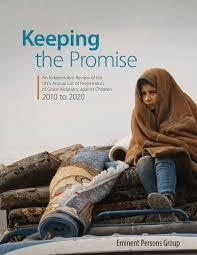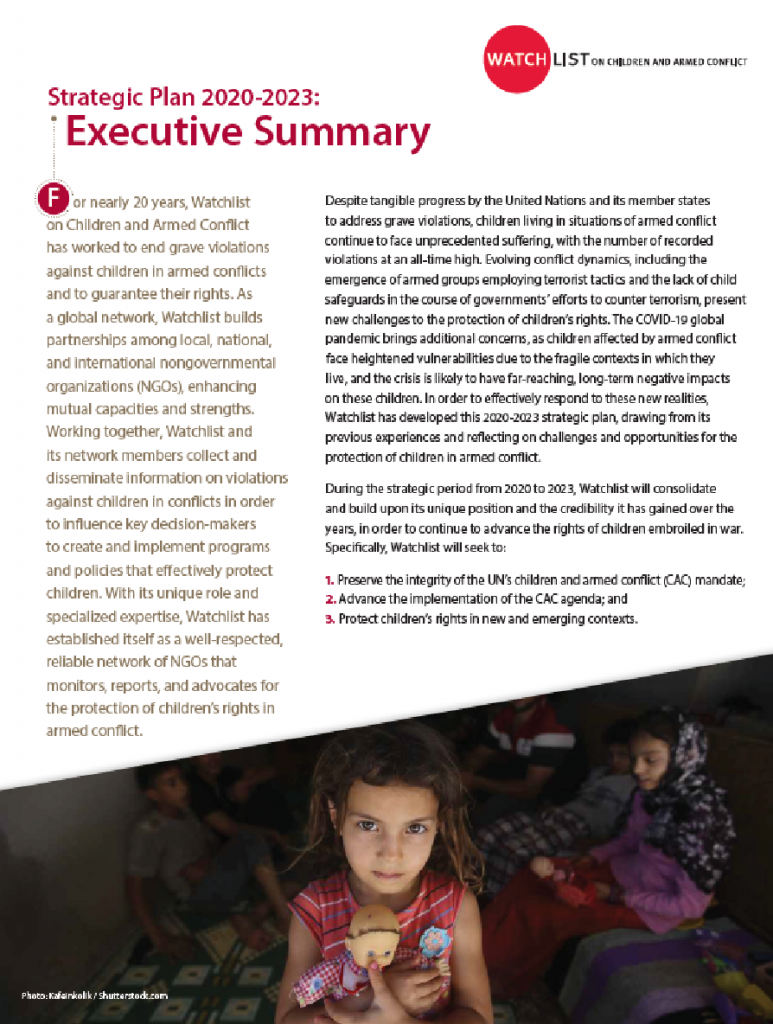
https://watchlist.org/wp-content/uploads/eminent-persons-group-report-fi...
https://dallaireinstitute.org/wp-content/uploads/2021/03/DI-Press-Releas...
A good article covering the issue: http://www.ipsnews.net/2021/03/un-sanitizes-killings-children-armed-conf...
https://alliancecpha.org/en/child-protection-online-library/report-keepi...
The list of perpetrators in the Secretary-General's annual report on children and armed conflict (CAAC) has been the linchpin of the UN’s system of accountability for grave violations against children in conflict. Sadly, over the past few years, especially since 2015, the process for listing perpetrators of grave violations has become increasingly tainted by political considerations.
An Eminent Persons Group of international child rights experts undertook an independent assessment to examine the Secretary-General’s decisions to list and 'delist' parties in the last decade, in view of relevant Security Council resolutions on CAAC and the Secretary-General’s own stated criteria for listing and delisting. The analysis identified dozens of cases in which armed forces or groups responsible for repeated and serious violations against children in war were omitted or removed too early from the Secretary-General’s annual list of perpetrators.
The Eminent Persons Group was convened by Watchlist on Children and Armed Conflict and includes Lieutenant-General Roméo Dallaire (Ret’d), the former UN force commander during Rwanda’s genocide; Yanghee Lee, former chair of the UN Committee on the Rights of the Child; Benyam Dawit Mezmur, former member of the African Committee of Experts on the Rights and Welfare of the Child; and Allan Rock, Canada’s former UN ambassador.
The resulting report includes recommendations for the Secretary-General, UN Member States, as well as several UN bodies and agencies focusing on children in armed conflict.
STATEMENT FROM THE DALLAIRE INSTITUTE ON TODAY’S REPORT CRITICIZING THE UN FRAMEWORK TO PROTECT CHILDREN IN WAR March 17, 2021
25 years since Graça Machel’s groundbreaking report on the Impact of Armed Conflict on Children, one of the most important instruments of child protection has been the UN Secretary-General’s annual “List of Shame.” Adopted in 2001, this mechanism was created to maintain the highest standard of verification for incidents—such as the recruitment and use of children as soldiers—and name every perpetrator, both member states and non-state actors, where grave violations against children were independently confirmed.
Today, the founder of the Dallaire Institute for Children, Peace and Security (Dallaire Institute), Lieutenant-General The Honourable Roméo Dallaire, among other eminent persons and experts on Children and Armed Conflict (CAAC) supported by Watchlist, released a report analyzing and critiquing the process for listing perpetrators.
The report’s findings cover the last ten-year period and include several cases where influential member states have evaded listing, by lobbying to be delisted or avoid being listed altogether, despite committing grave violations against children. As the report states, “It is deeply troubling that even well-documented incidents—sometimes affecting hundreds of victims—have not consistently triggered the listing of their perpetrators.” The authors of this report demand that the Secretary-General use this critically important mechanism to hold all perpetrators to account without fear or favour. Through 10 years of prevention-oriented work, the Dallaire Institute has constantly looked to how global systems can better support recruitment prevention efforts.
One of the ways is through improved data collection and analysis to better understand what makes some children more vulnerable to recruitment than others. As such, our Knowledge for Prevention (K4P) project aims to develop an early warning system – notably the first of its kind – for child soldier recruitment and use that could be used to inform early and collaborative action to better protect children in conflict and fragile environments. General Dallaire and Executive Director Dr. Shelly Whitman look forward to reinforcing the work of the UN Special Representative to the Secretary General on CAAC in ensuring these critical instruments of prevention and protection are utilized effectively, efficiently, and uniformly, without political interference, noting that “fulfilling our promise to children also demands greater investments in monitoring and early warning systems.” For more information, contact Anthony Di Carlo, Director of Policy, Advocacy, and Communications anthony@dallaireinstitute.org 514-816-7707











Add new comment